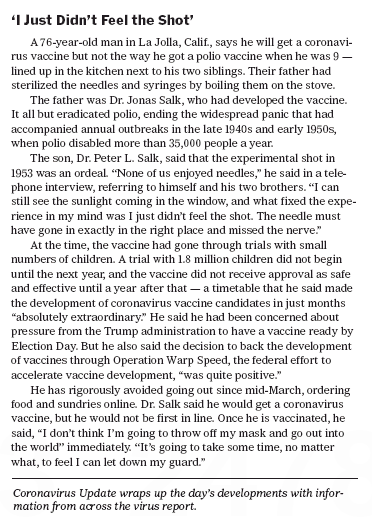(p. A1) GENEVA—Sylvie Briand landed in China looking for answers. Nearly a month had passed since word of a mysterious pneumonia had emerged. It was now late January and the World Health Organization was struggling to learn more about it.
Frustrated with mounting cases and limited information from China, the WHO’s top brass, including Dr. Briand, flew to Beijing to resolve a burning question: How easily did this new disease spread?
They met with President Xi Jinping. They had a phone call with local WHO staff just back from the Wuhan epicenter, quarantined after one developed a cough. Dr. Briand, the agency’s director of global infectious hazard preparedness, drew up a list of questions for Chinese health officials.
By the time the WHO received answers, the Covid-19 pandemic was stumbling into emergency rooms on three continents. Its spread around the world had already begun on Jan. 30 [2020] when the WHO declared a global public-health emergency, its one and only level of alert.
. . .
(p. A10) “Now is the moment for all countries to be preparing themselves,” Director-General Tedros Adhanom Ghebreyesus declared on Feb. 4, when the WHO reported more than 20,600 cases in 25 countries.
But that same day, the WHO also asked nations not to close borders—following its standard protocol, as such restrictions might discourage governments from reporting outbreaks. Within weeks, the virus landed on the agency’s doorstep, turning Geneva into a hot spot.
. . .
To write its recommendations, the WHO solicits outside experts, which can be a slow process. It took those experts more than four months to agree that widespread mask-wearing helps, and that people who are talking, shouting or singing can expel the virus through tiny particles that linger in the air. In that time, about half a million people died.
. . .
A review of the WHO’s initial response to the pandemic, based on interviews with current and former WHO staff, public-health experts advising it and officials who work with it, suggests that the agency’s bureaucratic structure, diplomatic protocol and funding were no match for a pandemic as widespread and fast-moving as Covid-19.
. . .
On Jan. 3 [2020], representatives of China’s National Health Commission arrived at the WHO office in Beijing. The NHC acknowledged a cluster of pneumonia cases, but didn’t confirm that the new pathogen was a coronavirus, a fact Chinese officials already knew. That same day, the NHC issued an internal notice ordering laboratories to hand over or destroy testing samples and forbade anyone from publishing unauthorized research on the virus.
China’s failure to notify the WHO of the cluster of illnesses is a violation of the International Health Regulations, said Lawrence Gostin, professor of global health law at Georgetown University who has advised the WHO on international health regulation matters. “Once a government knows that there is a novel virus that fits within the criteria, which China did, it’s obliged to report rapidly,” he said.
China also flouted the IHR by not disclosing all key information it had to the WHO, said David Fidler, an expert on global health and international law at the Council on Foreign Relations. The regulations call for member states to provide the WHO with “timely, accurate and sufficiently detailed public health information available to it on the notified event.”
(Note: the online version of the story has the date August 28, 2020, and has the title “How Coronavirus Overpowered the World Health Organization.”)


